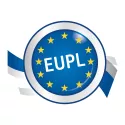
In July 2024, Eva van Sloten commented the implementation of the (EU) Open Data Directive in the (NL) Government Information Reuse Act, noting that such reuse and sharing mean the use of open licenses.
This was the opportunity to provide an overview of the main licenses used by Dutch authorities:
| Organisation | Permissive licenses | Copyleft licenses |
| Centraal Bureau voor Statistiek | MIT | GNU GPL |
| Centraal Justitieel Incassobureau | EUPL | |
| De Nederlandsche Bank | MIT | |
| DICTU | MIT | EUPL |
| Economische Zaken | BSD | GNU GPL |
| Municipality Amsterdam | Mozilla Public License | |
| Kadaster | MIT | EUPL |
| KNMI | Apache 2.0, MIT | GNU GPL |
| Koninklijke Bibliotheek | Apache 2.0 | |
| Ministerie BZK | EUPL | |
| Ministerie VWS | MIT | EUPL |
| Nationaal Cyber Security Center | MIT, ISC | EUPL |
| Politie | Apache | |
| Universities | MIT | GNU GPL |
Van Sloten provides the classical distinction between “Permissive” (no condition imposed for re-distributing copies or derivatives) and “Copyleft” licenses (copies and derivatives must stay under original license).
The Permissive license used are generally MIT, and in some cases Apache.
The Copyleft license uses are generally EUPL (6 cases) and in some cases GPL (3 cases) or MPL (1 case).
But the article was commented by readers questioning the “copyleft” classification. Indeed, for the “historical / traditional” free software foundation (FSF) that promoted the GPL at the end of the previous century, the copyleft must be “strong” (some even said “viral”) and even the simple fact of linking two programs, if one of them is covered by the GPL, extends the GPL to both.
This is not at all the interoperable point of view of the EUPL for which, according to the European law, interoperability cannot by restricted by copyright provisions, as already published in: https://joinup.ec.europa.eu/collection/eupl/news/why-viral-licensing-ghost
Comments highlight that the “reciprocal and share alike” conditions, which are combined in “copyleft” and are present in the EUPL are much more reasonable: no “virality” and wide compatibility with other licenses, making it closer to the weakly copyleft MPL than to the GPL.
Referenced solution


